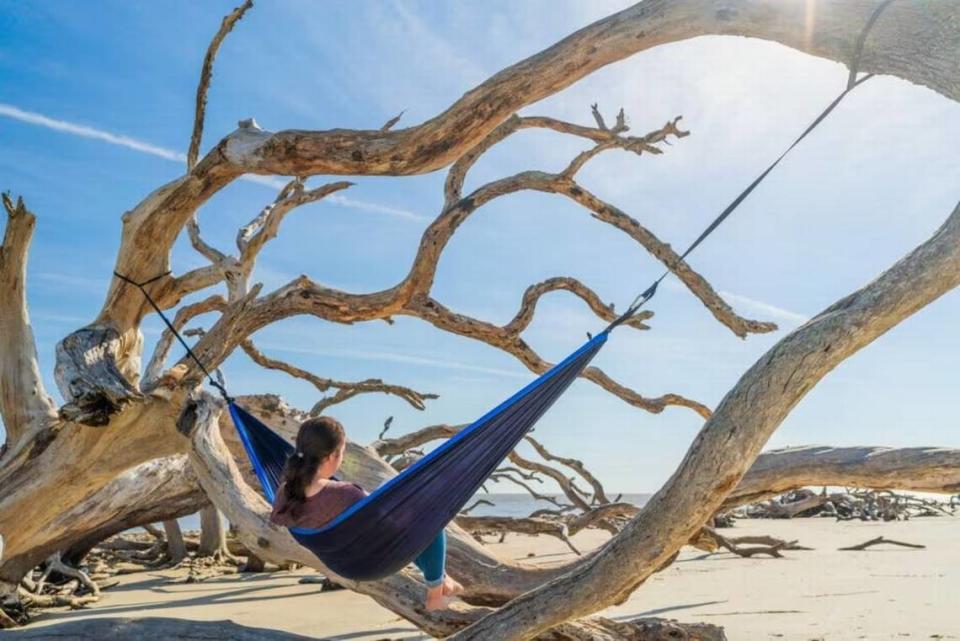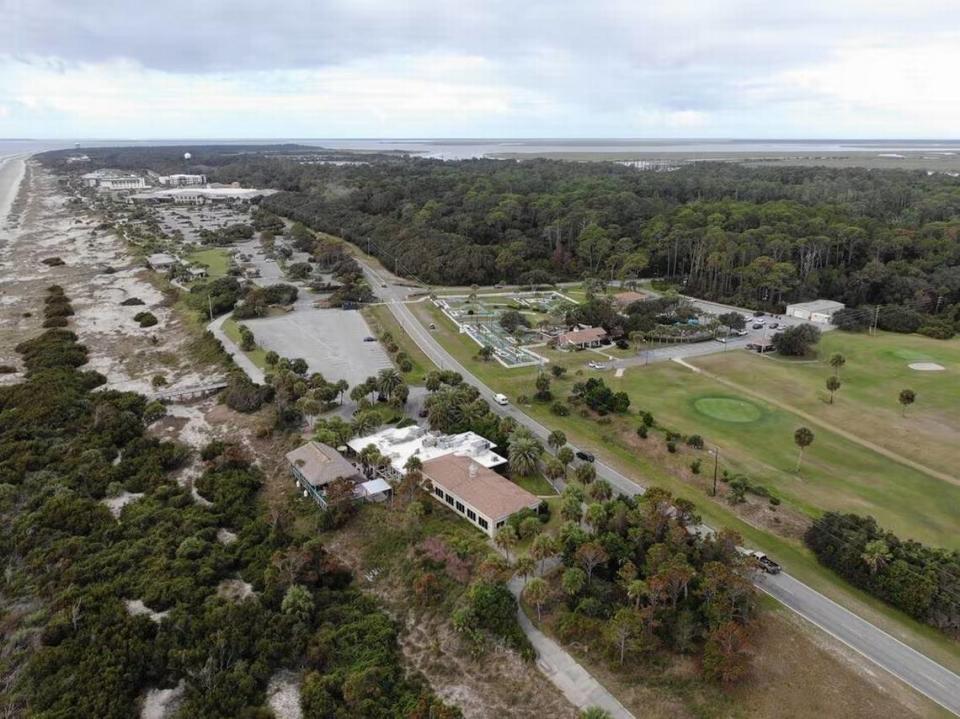Georgia’s Jekyll Island has retained its natural charm, but development fears linger
The note is buried in a data-heavy government report, but the words define the risks of this popular Georgia coastal retreat becoming a “disappointing” destination.
“Visitors are attracted to the unique natural and undeveloped destination that is Jekyll Island,” the missive reads.
Rather than emulating kitschy tourist traps like St. Augustine or resort communities like Hilton Head, the report says Jekyll — located south of Savannah off the Georgia coast — should take inspiration from the undeveloped “Cumberland Island or Little St. Simons Island, rich in culture, history, and nature.”
Written as part of a four-year strategic plan in the summer 2023 by Jekyll Island’s then-newly appointed chief steward, Mark Williams, the warning is well-timed. This barrier island state park, a few miles south of Brunswick, is entering a new era where Jekyll’s unique balance of unspoiled nature and creature comforts will be tested.
A 15-year-long revitalization initiative that has brought new oceanfront hotels, shops and a state-run convention center — and a recent tourism surge — is nearing completion. Set to begin in the new year is an overhaul of the island’s golf course complex and upgrades to the Pier Road retail corridor, located in the shadow of the iconic Jekyll Island Club.
Both the golf course and Pier Road improvements have drawn public concern. The shopping district overhaul has the potential to displace long-standing tenants deemed underperforming to make room for businesses that, in the words of a senior island official, better support Jekyll’s “visitor mix.” Businesses at risk include the Island House gift shop and art gallery, which opened in 1997, and The Commissary, a Georgia-based specialty food gift shop in operation since 2001.
“What they call ‘the revitalization of Jekyll’ is not over,” said island resident Mindy Egan, co-founder of the development watchdog group The Initiative to Protect Jekyll Island. “They are just changing the terms.”
Political ‘third rail’
Jekyll’s development has been labeled a “third rail of Georgia politics” for generations.
Once the playground of industrial titans like the Rockefellers, Pulitzers and Morgans, Georgia bought the island out of bankruptcy after World War II and made it a state park to be preserved by law for the enjoyment of “people of average income.” The Jekyll causeway and bridge opened in 1954, and hotels, a convention center, a golf complex and other amenities quickly followed.
The island is also home to a few hundred permanent residents like the Egan family who own or rent their homes and lease the land from the state authority.

Recognizing the need to protect Jekyll from overdevelopment, the General Assembly passed a law in 1971 requiring about two-thirds of the island remain as sand, marsh, scrub pines and live oaks — or in other words, undeveloped. A 2014 revision to that statute capped future development of primitive land to 78 acres, with only 20 of those acres designated for commercial, residential or other unrestricted use.
Today, only 60 untouched acres remain eligible for development, and 40 of those are reserved for public facilities involving health, safety or recreation.
As a result, Jekyll visitors don’t find blocky hotels or condo high-rises blocking views of the Atlantic Ocean or access to the beach. Parking is plentiful and not metered — the island’s $10 entry fee, collected on the causeway, covers the cost. Jekyll doesn’t have a single traffic light.
“That’s what makes Jekyll so unique,” said Williams, executive director of the Jekyll Island Authority, the state agency that operates the island. “There are booming islands near us, like Tybee and St. Simons Island. If you want hustle and bustle that’s where you go. Here, we want a balance with natural beauty.”
Yet, the development restrictions did throw Jekyll into a prolonged Mr. Hyde stage. No new hotels opened between 1974 and 2010, and the island went 20 years without adding a noteworthy tourism attraction before the Georgia Sea Turtle Center opened in 2007.
As Jekyll’s tourism infrastructure aged in place, visitation cratered, from a then-record high of 2.1 million visitors in 1989 to a record-low 1.5 million in 2007. The decline threatened financial ruin for an island designed to be self-sustaining and funded through land leases, visitor fees and revenues from enterprises such as the convention center, the water park and the golf facility.
The dire straits prompted the Jekyll Island Authority to spearhead a $285 million improvement plan in 2008 meant to be “transformative” and spark a tourism renaissance.
The overhaul worked: Visitation has topped 3 million people each of the last two fiscal years and is on pace to set a new record in 2024. And the island’s finances have never been sunnier — a combined $18.7 million profit in fiscal years 2021 and 2022, even as expenses have doubled since 2007.
‘Developers drool over this place’
As officials like to say, Jekyll is now back to being Jekyll.
The path to success was pockmarked by man vs. nature standoffs that fuel the angst over the next redevelopment phases, particularly the one at the Jekyll Island Golf Club. Residents and environmental groups want protections for what is currently greenspace and recreation area there; the JIA board of directors has responded with what critics call half-measures.
The watchdogs remember the tempting plans put forth by ambitious developers during the revitalization initiative. A bid to turn the island’s 4-H center and neighboring soccer complex into estate homes and condos contributed to the 2014 revision to the 1971 conservation legislation.
In the new law, the General Assembly restricted any redevelopment of those sites to “same or similar purposes,” effectively prohibiting those properties from being converted to commercial or residential entities in the future.
The JIA board is not considering similar limits for the golf course property but did approve the creation of a Greenspace Preservation District encompassing about 660 acres, including most of the golf course complex. The district is reserved for low-impact recreational activities, wildlife habitats and natural resource conservation areas.
However, the JIA has so far declined to ask the Legislature to codify the greenspace designation under state law. And the district boundaries were drawn to exclude the target of the next redevelopment initiative — the 26 acres of tees, greens and fairways, along with the club’s driving range, that will be available for what is termed “low-impact development.”
Proposed uses include an assisted living facility, a 50-room hotel dubbed a “golf lodge” and a small restaurant and retail complex. Planning for those as-yet-unfunded projects could begin as early as this year.

Island residents fear a steady carving away of the golf course and other recreational areas for commercial uses, according to Jim Reed, who moved to Jekyll in 2005 and is part of the Jekyll Island Men’s Golf Association.
“By law, the JIA has 40 more undeveloped acres to work with, should lean times return and they need additional revenue opportunities,” Reed said. “They should leave the greenspace alone.”
A showdown is imminent. The golf club renovations are scheduled to begin Tuesday with turf and irrigation improvements to the Pine Lakes course. Once that work is completed next fall, the JIA will start restoration of the island’s original golf track, Great Dunes, which will involve the permanent closure of nine holes of a neighboring course — the site reserved for the wildlife corridor and the “low-impact development.”
Meanwhile, Reed, Egan and other development watchdogs will continue to lobby for new protections, pointing to the JIA’s Williams’ “disappointing destination” warning.
“Developers drool over this place,” Egan said. “Without action, it’ll be death by a thousand cuts.”
Jekyll Island, the modern era
The Great Depression bankrupted the Jekyll Island Club and led to the State of Georgia’s purchase of the island.
1947: Island bought for $675,000
1948: Island established as a state park
1950: Jekyll Island Authority created to develop island into a resort
1954: Causeway and bridge linking island to U.S. 17 opens
1961: Jekyll Island Convention Center opens
1971: General Assembly passes legislation limiting development on the island
1974: Last of the initial wave of island hotels opens
1978: Jekyll Island Club granted federal Landmark Historic District status
1982: First paved bike path on island opens
1987: Summer Waves water park opens
2007: Georgia Sea Turtle Center open
2008: JIA adopts a revitalization plan that calls for improvements on developed properties island-wide
2010: Hampton Inn opens as island’s first new hotel since 1974
2012: New Jekyll Island Convention Center opens
2014: General Assembly revises legislation capping the number of primitive acres eligible for development
2015: The Beach Village retail center and Westin Resort open next to the convention center
2024: Renovations to Pine Lakes golf course begin, the first phase of a series of improvements on the Jekyll Island Golf Club
(This story comes from our partners at The Atlanta Journal-Constitution. For more on the news and events in metro-Atlanta and Georgia, visit AJC.com.)

